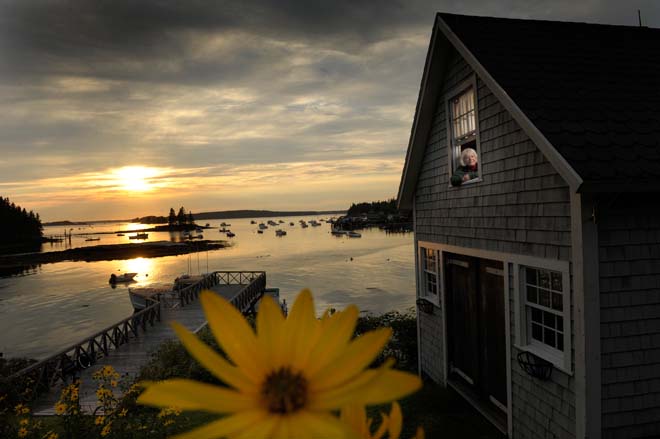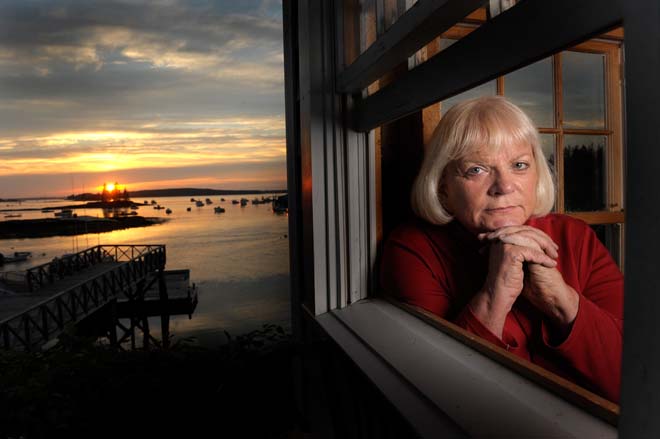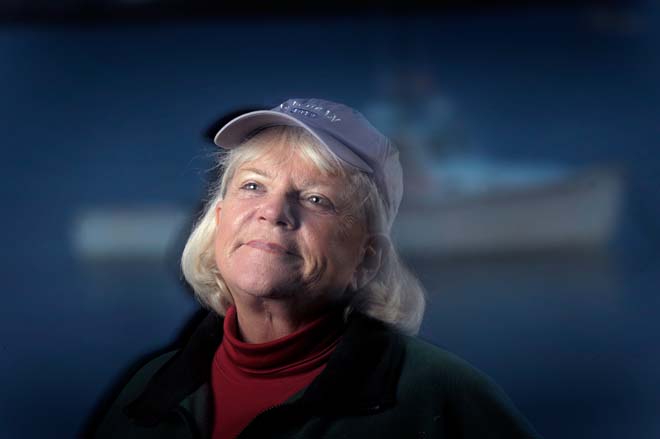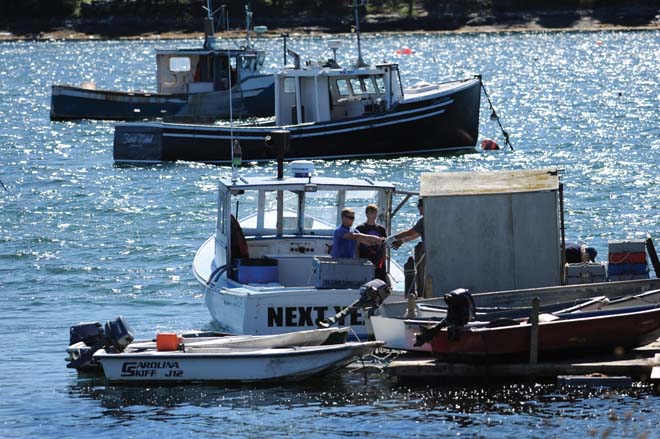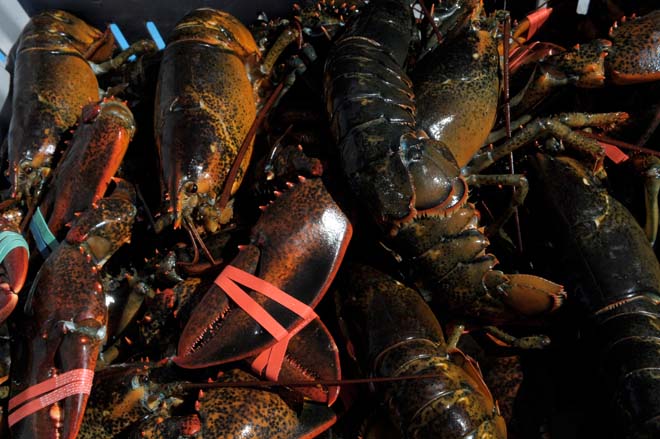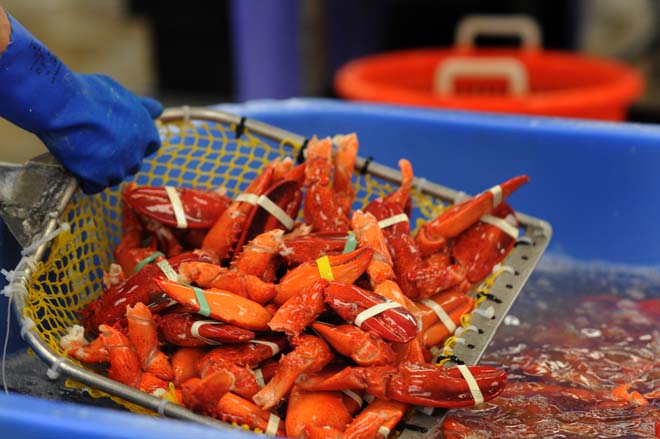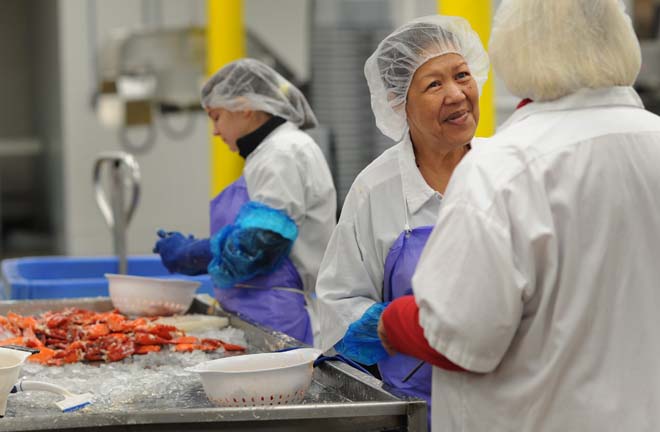The Relentless Perfection of Linda Bean
PROFILE
By Jaed Coffin
Photographs by Fred Field
Talk of lobster with the L.L. Bean heiress.
It’s a hot afternoon at the public wharf in Port Clyde. In the distance, two shirtless men on a roof hustle through some late-season repairs. At the bottom of the hill, packs of tourists wander in and out of the Port Clyde General Store in their final days of vacation.
On a sunny patio toward the end of the wharf, several families dine at the Dip Net Restaurant—at picnic tables beneath red and yellow umbrellas. The general store and the Dip Net are both owned by Linda Bean. You can tell by the font on the signage: it’s old-looking, and faded, as if recalling a more rugged, more prosperous time.
I called Linda Bean’s assistant a few hours ago to see if I could meet with Linda sometime this week, and he said that although Linda was on her way to Tampa the next day to attend the Republican National Convention as a Maine delegate representing Ron Paul, she still wanted to find time to catch up. Her most recent project—reviving the lobster industry in Maine—was something that she wanted people to know about. A few minutes later, her assistant called back and asked if I could be in Port Clyde in two hours. Linda, he said, was going to take me out on her yacht.
I ask one of the waitresses at the Dip Net if she’s seen her boss. She shrugs. “I think she was supposed to come around today,” she says, as if a sighting of the granddaughter of Leon Leonwood Bean is as common as seeing a cormorant pop out of the harbor.
I dial the cell number her assistant gave me. Linda Bean answers.
“Well, hi!” she says. “I’m coming around the point right now. Meet me at my place in ten minutes.”
What “point”? What “place”?
The last time I met with Linda was two weeks ago, in Linda Bean’s Maine Kitchen and Topside Tavern in Freeport. As I made my way into town, I took a minute to reflect on the image of Linda Bean that I was carrying into our meeting. It takes all of six seconds online to learn a great deal about her staunch devotion to classically conservative political ideals, and about her hard-line stance on many divisive social issues. But nothing I had read about Linda Bean—she’s been called everything from “fascist heiress” to a “smart, hardworking businesswoman”—seemed to describe the 70-year-old woman sitting by herself at a table on the second floor of the restaurant. She was wearing a brown turtleneck and sweatpants. Her short blond hair was frazzled, and she was attending to some sort of paperwork. Around her, a bustling waitstaff delivered towering platters of lobster rolls and local beer to tables of families from all over the country.
She greeted me graciously, one of the waitstaff brought me a ginger ale, and Linda Bean got to the point: the vertical integration of Maine’s struggling lobster industry. In short, Linda Bean wants to keep Maine lobstermen in business by investing in the local economy, putting people to work, and claiming for Maine’s residents what is rightfully ours.
Understanding Linda Bean’s approach to this problem requires a little bit of unpacking. When most of us look at the boats gliding in and out of harbors in our favorite coastal towns, we tend to think that the final expression of all that hard work is the boiled red critter steaming on gingham tablecloths from Eastport to Kittery. Despite the appeal of that buttery image, the truth is that only about ten percent—about a leg’s worth of lobster meat—makes it into local tanks. The other 90 percent of a lobsterman’s product is bought up by wholesalers, who ship the lobsters to processing plants that distribute the processed meat to buyers with contracts all over the world.
According to Linda Bean, what many people don’t know is that the majority of lobster caught by Maine lobstermen leaves the state rather quickly and is processed in Canada. The Canadian processing plants are subsidized by government funding. And because the subsidized Canadian market is able to undersell the unsubsidized Maine market, people in the business have started searching for new strategies.
“If there’s one thing I want to do,” she told me, “it’s to clarify what exactly a Maine lobster is.” To Linda, selling our lobsters to Canadian processors who are reaping the profits of the Maine brand is nothing short of an act of cultural hijacking. One of her solutions to this problem has been to buy up wharves and pounds in Maine fishing communities—Port Clyde, Tenants Harbor, Vinalhaven—and to bring all the processing to her plants in the former sardine-canning town of Rockland. Her vision is about streamlining the industry, keeping it close to home. She’s taken to calling this diversity of efforts “amalgamated enterprises.”
But I still don’t know how to get to her house. When I ask for clarification, Linda gives me some old-fashioned Maine-style directions: up the hill, look for the church, drive a little ways farther, and wait for a guy named Dennis to meet me at the dock. I don’t know who Dennis is, and I don’t remember passing any church, but I’m on my way.
The house is a small New Englander with dormers and latticework around the soffits. The deck looks out across Port Clyde. To the right are vacation homes, many of which are much more luxurious than Linda Bean’s, and beyond the homes is a dock that Linda bought nine years ago. Currently, whirring chainsaw noises are emanating from the dock. A lavish yacht with elegant lines and a folded American flag in the passenger seat is anchored off the wharf.
Then Dennis comes down the ramp. He’s wearing a blue Dickies work outfit and logging boots, and he nods to me politely, but doesn’t say anything. I tell him who I am. “Oh,” he says. We shake hands. “I thought you were a renter.” He tells me the plan is to move this big beautiful yacht from Port Clyde to a mooring in Tenants Harbor. This maneuver will free up some space for another 40-foot boat—built in Maine, Dennis says, but fished out of Salem, Massachusetts—that Dennis, over the coming winter, will transform into a passenger boat for Linda’s next big idea: giving educational tours of Port Clyde and Tenants Harbor during which people will learn about the culture of this part of Maine. On the excursion, passengers will even be able to see the angle from which Andrew Wyeth painted his iconic work, Christina’s World (although many art critics suggest that Wyeth created the painting from a composite of local images).
Soon afterward, Linda Bean shows up. She’s more coiffed today than when I last saw her, but she looks kind of tired. She just drove up from Freeport this afternoon, and she’s carrying one of her shoes in her hand because of a foot injury. We shake hands, she smiles, and we get on her yacht. Linda pilots.
As we head into the harbor, Linda points out several buildings she owns. There’s a yellow property—a boathouse—that Linda hopes to transform into a learning center where people can educate themselves about Maine’s lobster-industry heritage. She even intends to turn her own home into “Linda Bean’s Perfect Maine Kitchen,” where she can invite people inside to watch how to properly cook a Maine lobster. The wharf she owns is busy with lobster boats unloading their catch. Two men on a massive barge full of broken chunks of piling wave to her without breaking from their work. Linda points out a property on Hupper Island, where John Roberts, chief justice of the United States, bought a place a few years ago. Roberts recently threw a party there, and Linda Bean pleaded her case for Maine lobster to various senators and Washington figures.
Linda scans the horizon and points out the new guy in town: 23-year-old Kyle Murdoch from Monhegan Island. He just opened his own processing plant—called Sea Hag—and is offering Linda Bean some healthy competition. It’s clear that Bean admires Murdoch’s ambition, but she’s well aware of the hard realities he will face. “He’s going into the toughest sector right away,” she says. “It took me some time to learn this business. If you’re not careful, you can lose your shirt.” Somewhere in the middle of St. George Bay, Linda tells me about a recent trip she took with her grandson (all of Bean’s four grandchildren live in Maine) to the Reversing Falls in St. John, New Brunswick. “The falls got dicey,” Linda says, “so I just gunned it!”
Linda also talks about the years she spent raising her children in Alaska, about her early forays into politics, and about the sense of heritage and history that surrounds her in this state, and extends far beyond the name of her grandfather. She claims that she’s a descendant of colonists who came to America on the Mayflower and “great pioneers” who lived in Maine, Massachusetts, or New Hampshire over several centuries.
We turn into a quiet harbor. Dennis buzzes us to shore in a small dinghy, while Linda tells me about the recent controversy embroiling the Republican delegation from Maine. In two days, the issue will turn into a formal protest in Tampa, and receive major media coverage. And in many ways, Linda Bean will be right in the middle of it. While we’re walking up the ramp, dusk-light falls over the placid harbor and wharf. It seems unlikely that any force ought to deliver Linda Bean, in this moment, anywhere else but here.
Bean’s properties pepper the roads of Tenants Harbor, marked by small real-estate signs in the yard that read: “Linda Bean’s Perfect Maine Vacation Rentals.” I ask her why she is buying up property rather than reinvesting in lobster-industry initiatives. Real estate, she says, “is my first love,” and house assets are more liquid than lobster-processing plants. As we pass the Tenants Harbor General Store—a property she also owns—Linda tells me, “I get lots of offers from people to buy their homes, but everyone complains when I do.”
Before we return to her house in Port Clyde, we stop off at the wharf we passed earlier that day. Several men are unloading buckets of crabs from a boat.
“Hey,” she calls to a man in a camouflage hat and shirt, a cigarette hanging off his lip. He looks up at her. “We’re going to start crab processing soon, and I’ve got 30 new positions opening up.”
The man raises his eyebrows. “Yeah?” he says. “I’ll spread the word. My sister and cousin are already working up there.”
“Good,” Linda says. “Tell all your friends.”
At this point, I’ve stopped taking notes, and I’m doing some rough calculations to estimate how many people have found employment with Linda Bean. I’m weighing that vague number against everything I know and don’t know about her, and then weighing that non-fact against some intuitive sense of what Maine is, right now, in 2012. That non-answer seems as vast and unknowable as the fading horizon. The daylight has all but disappeared, and the workday feels as though it should have ended an hour ago. But then I look at Linda Bean: she’s gazing out across the water, at her wharf, at the men dragging crates of crab up a ramp, and I think: she has to be tired, because I am.
“Well,” she says, shrugging, and adjusting a baseball hat adorned with the logo of her Perfect Maine brand. “Anything else you want to see?”


